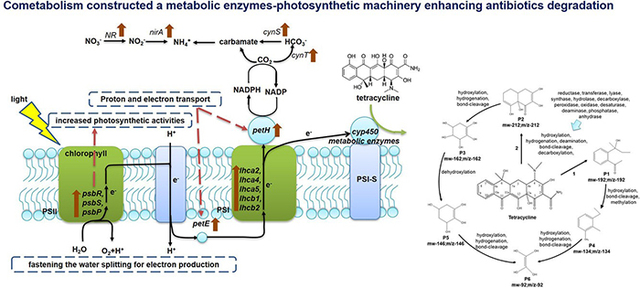Recently, the research team led by Prof. Ru Shaoguo at the Key Lab of Marine Environment and Ecology Engineering at Ocean University of China (OUC) published in Water Research under the title of “Unraveling the key driving factors involved in cometabolism enhanced aerobic degradation of tetracycline in wastewater”.
Environmental antibiotic pollution is one of the major problems that seriously threaten the global environmental security and public health. At present, there is no efficient technology for remediation. Microalgae have shown great potential in the treatment of antibiotic-contained wastewater. However, the relatively long hydraulic retention time (HRT) is the bottleneck of its practical application.
As an ideal approach to shorten the HRT, cometabolism is able to drive microorganisms to degrade refractory antibiotics while utilizing easily degradable organic matters. The team’s research proved that the micro-scale cometabolism substrate not only removed 100% tetracycline, but also shortened the degradation time by more than 40%. At the same time, the cometabolism substrate upregulated the linear electron transfer chain in the cells of microalgae, and the increase of efficiency in transferring electron was conducive to the redox efficiency of degrading enzymes to antibiotics.
This paper proposes for the first time that cometabolism provides more energy and catalytic factors to promote the degradation of antibiotics in microalgae by the coupling synthesis of degrading enzymes and electron transfer. It also indicates the potential application of cometabolism in microbial degradation of antibiotics, with a unique insight into the analysis of cometabolism in aerobic degradation.

Translated by Piao Simeng
Edited by Xu Derong, Yu Hong